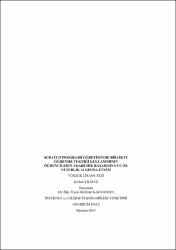Scratch programı öğretiminde birlikte öğrenme tekniği kullanımının öğrencilerin akademik başarısına ve öz yeterlik algısına etkisi
Abstract
Bu araştırmanın amacı Bilişim Teknolojileri ve Yazılım dersi kapsamında açılan DYK(Destekleme ve Yetiştirme Kursu) programında Scratch ile programlama ünitesinin öğretiminde birlikte öğrenme tekniği kullanımının öğrencilerin akademik başarısına ve Scratch programına karşı öz yeterliliklerini olan etkisini incelemektir. Araştırmada asıl amaca ek olarak, birlikte eğitim programının uygulandığı deney grubu ve geleneksel eğitim programının uygulandığı kontrol grubu öğrencilerinden kadın ve erkekler arasında akademik başarı ve öz yeterlilik düzeyleri arasındaki farkların incelenmesi araştırma kapsamında tutulmuştur. Yapılan çalışma deneysel araştırma modeline göre desenlenmiş olup deney grubunda işbirlikli öğrenme yöntemlerinden birlikte öğrenme tekniği, kontrol grubunda ise öğretmen merkezli geleneksel öğretim yöntemi uygulanarak Scratch ile programlamanın öğretilmesi hedeflenmiştir.
Araştırma 2018-2019 eğitim-öğretim yılı ikinci döneminde İstanbul ili Esenyurt ilçesinde bulunan bir ortaokulda öğrenim görmekte olan 6. sınıf öğrencileri ile yapılmıştır. 28 öğrenci deney grubunda ve 28 öğrenci de kontrol grubunda olmak üzere toplam 56 öğrenciyle gerçekleştirilmiştir. Uygulamanın sonunda deney ve kontrol grubunda bulunan öğrencilere Scratch programına ilişkin öz yeterlik ölçeği ve akademik başarı testi uygulanmıştır. Toplanan veriler IBM SPSS 22.0 programıyla analiz edilmiştir. Yapılan çalışma sonucunda birlikte öğrenme tekniği ile yapılan eğitimin, öğrencilerin Scratch programına ilişkin öz yeterlik algısını ve akademik başarısını olumlu yönde etkilediği sonucuna ulaşılmıştır. Fakat hem deney grubu hem de kontrol grubunda bulunan öğrencilerin cinsiyete ilişkin Scratch programına ilişkin öz yeterlik algısı ve akademik başarı notu arasında anlamlı bir farkın olmadığı sonucuna varılmıştır.
Ayrıca Scratch programına yönelik öz yeterlilik algısı ile akademik başarı notu arasında aynı pozitif yönde bir ilişkinin olduğu saptanmıştır. Daha açık bir ifade ile deney grubundaki öğrencilerinin Scratch programına yönelik öz yeterlilik algısı artıkça akademik başarıları da artmaktadır veya Scratch programına yönelik öz yeterlilik algısı azaldıkça akademik başarıları da azalmaktadır. The aim of this research is to examine the effect of using co-learning technique on students' academic achievement and self-efficacy for Scratch program in the teaching of Scratch and programming unit in DYK (Support and Training Course) program opened within the scope of Information Technologies and Software course. In addition to the main purpose of the study, the differences between the academic achievement and self-efficacy levels of the male and female students of the experimental group in which the co-learning program was applied and the control group students in which the traditional education program was applied were included in the research.The study was designed according to the experimental research model and it was aimed to teach programming with Scratch by using cooperative learning methods in the experimental group and traditional teacher-centered teaching method in the control group.The research was carried out with a total of 56 students , of which 28 were in the experimental group and 28 were in the control group in the 6th grade of Secondary School in Esenyurt district of Istanbul province in the second semester of 2018-2019 academic year.
At the end of the application self-efficacy scale and academic achievement test related to Scratch program were applied to the students in the experimental and control groups.The collected data were analyzed with IBM SPSS 22.0 program. As a result of the study, it was concluded that the co-learning technique had a positive effect on students' perception of self-efficacy and academic achievement related to Scratch-program.
However, it was concluded that there was no significant gender difference between self-efficacy perception and academic achievement score of the students in both experimental and control groups. In addition, it was found that there was a positive relationship between self-efficacy perception and academic achievement score for Scratch program.More specifically, the academic achievement of students in the experimental group increases as the perception of self-efficacy towards Scratch program increase or the academic achievement decreases as the perception of self-efficacy towards the Scratch program decreases.
Collections
- Yüksek Lisans Tezleri [879]



















